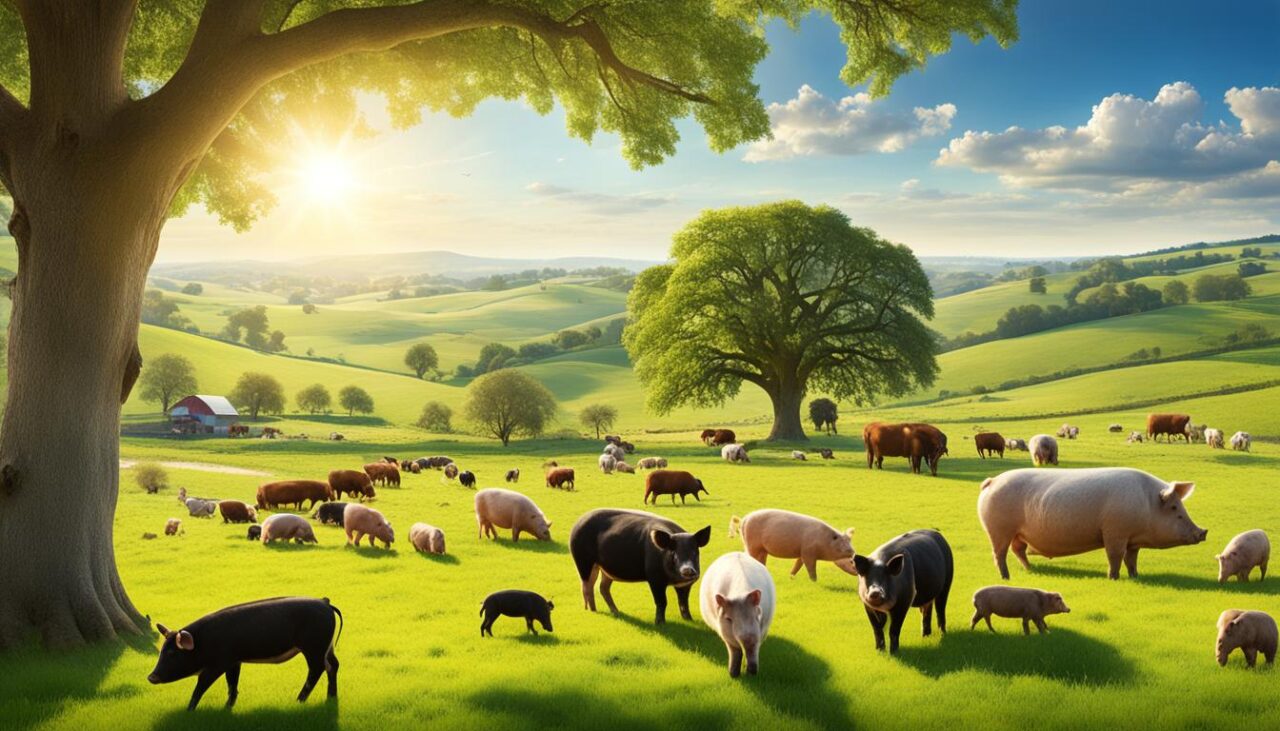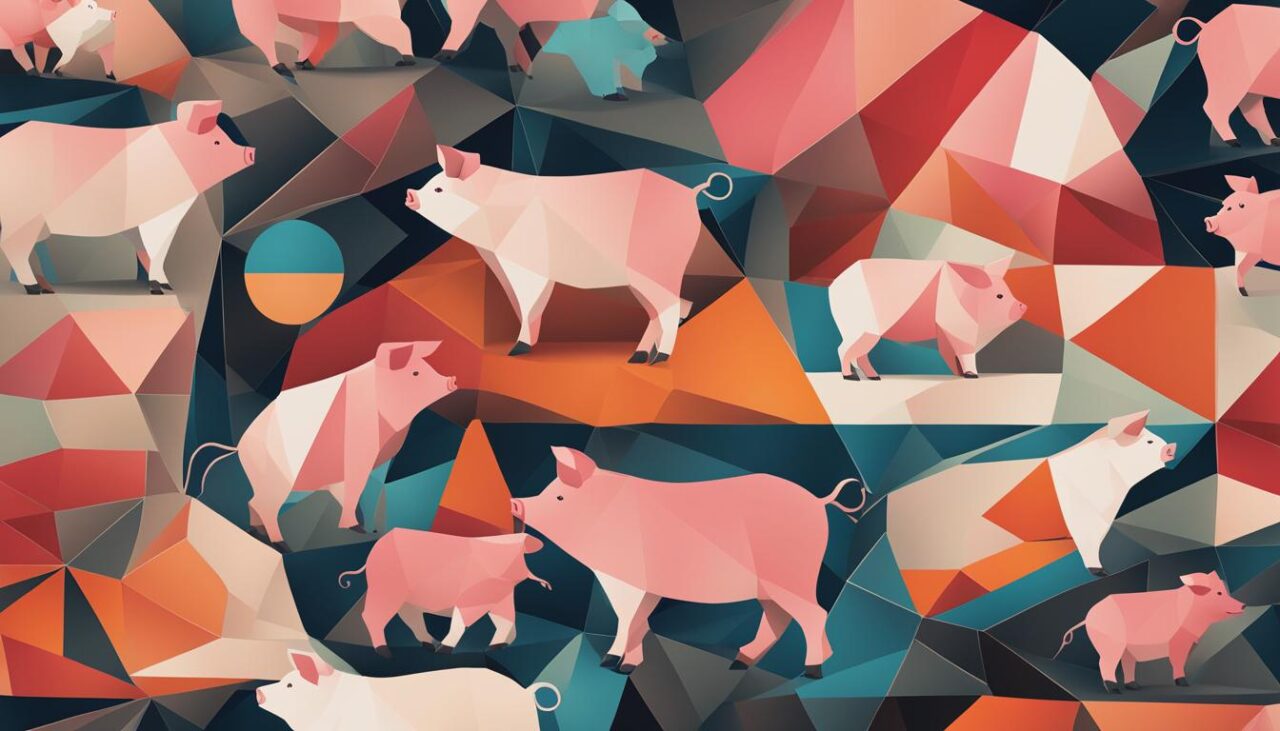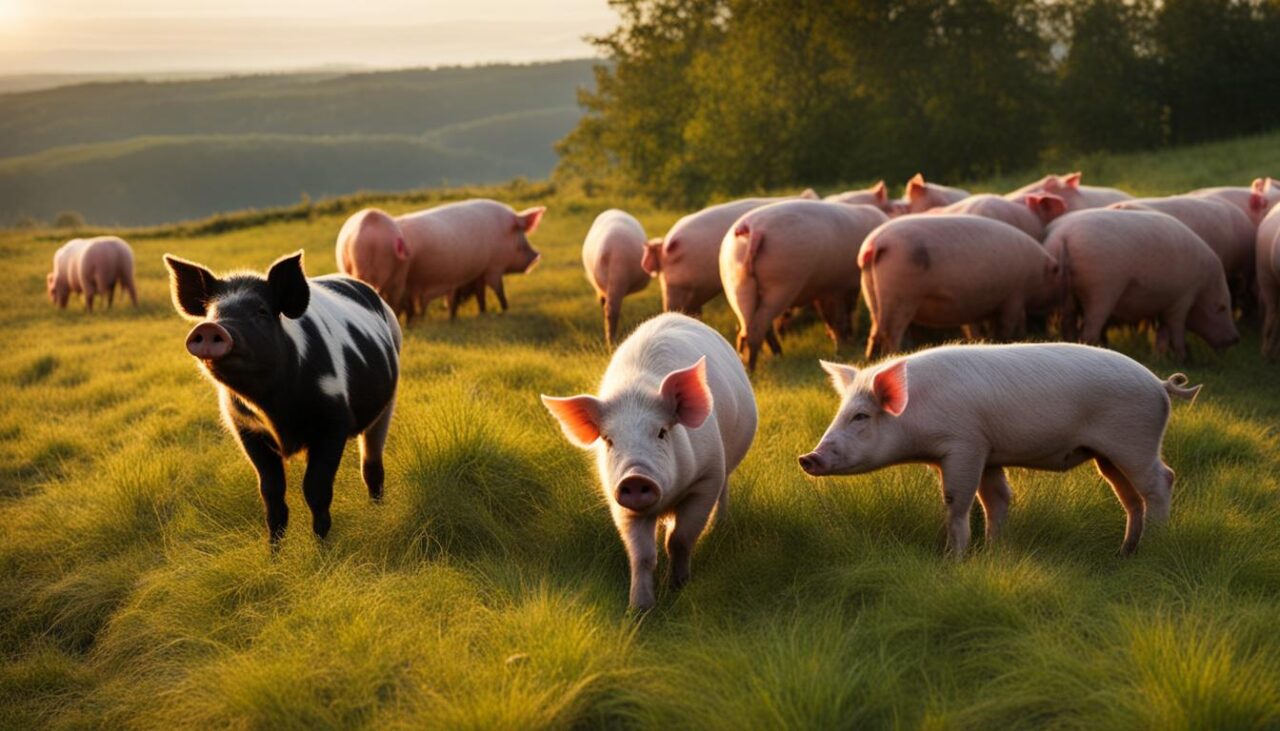Welcome to the captivating world of swine breeds and animal genetics. From rare heritage breeds to modern pig varieties, livestock breeding has a rich tapestry that is essential to farm diversity and agricultural biodiversity. The significance of preserving genetic diversity in this industry is paramount as it ensures a healthy ecosystem and sustainable farming practices. In this article, we'll take a deep dive into the diverse world of pig breeds, explore the importance of animal genetics in swine breeding, and discuss the critical role of preserving rare breeds for future generations.
Key Takeaways:
- Swine breeds play a significant role in maintaining farm diversity and agricultural biodiversity.
- Rare breeds contribute to the preservation of genetic diversity and are a valuable asset to sustainable farming.
- Understanding animal genetics is crucial to the success of livestock breeding practices.
- Preserving rare swine breeds ensures the survival of unique heritage breeds for future generations.
- The world of swine breeds is fascinating and requires our continued efforts to maintain genetic diversity and sustainability in agricultural practices.
The Importance of Swine Breeds in Farm Diversity
Swine breeds aren't just cute little piggies, they play a significant role in farm diversity. In fact, rare breeds of swine can contribute immensely to the preservation of genetic diversity and promote sustainable farming. With dwindling agricultural biodiversity, preserving rare breeds is essential for achieving and maintaining a healthy ecosystem.
But why are swine breeds such an important component of farm diversity, you might ask? Well, these unique breeds possess traits that are perfectly suited to different environments and situations. For example, some are hardier and more adaptable to harsher climates, while others have been bred for specific purposes like meat production.
Did you know? Heritage breeds of swine have deep-rooted genetic heritage and are an invaluable resource in maintaining the diversity of livestock. These rare breeds might play a crucial role in future breeding programs and could potentially be used to produce offspring that are resistant to diseases and environmental changes.
Moreover, incorporating different swine breeds into the farm setting provides more options for livestock breeding. With a diverse range of pig varieties, farmers can selectively breed pigs with desirable traits, such as high-quality meat, increased resistance to disease, and better temperament.
Maintaining a variety of swine breeds has the added benefit of enhancing food security. In the event of crop failure or other unforeseen circumstances, a diverse animal population can serve as a fallback option for food production.

At the end of the day, swine breeds are an essential component of farm diversity. By preserving rare breeds and incorporating a diverse range of pig varieties into farm settings, we can promote sustainable farming practices, maintain genetic diversity, and ensure food security for future generations.
Pig Varieties: Uncovering the Diverse World of Swine Breeds
Prepare to be amazed by the jaw-dropping variety of pig breeds out there. From porcine powerhouses to heritage breeds with serious pedigree, pig varieties possess a range of traits that make them stand out from the herd.
Take the Tamworth, for example. This ginger beauty dates back to the 19th century and boasts a distinct flavor and lean meat that sets it apart from other pig breeds. Or the Berkshire, renowned for its marbling and juiciness – a true superstar of the meat-loving world.
But it's not just the flavor that sets pig varieties apart. Oh no! Each breed has a unique history shaped by its geographical location, consumer demand, and agricultural purpose. And let's not forget about heritage breeds. These swine breeds are a direct link to our agricultural past and play a crucial role in preserving genetic diversity for future generations.
But Wait, There's More!
We've only scratched the surface of the diverse world of pig varieties. Next up, we'll explore the pivotal role that animal genetics play in swine breeding. Prepare to be blown away by the science behind selective breeding and genetic advancements.
The Role of Animal Genetics in Swine Breeding
When it comes to swine breeds and livestock breeding, understanding animal genetics is as important as having a reliable farmhand. Genetics plays a crucial role in determining desirable traits in pigs, such as size, conformation, and meat quality. Without a clear understanding of animal genetics, breeding programs could be haphazard, resulting in undesirable outcomes. That's why farmers and breeders alike are turning to genetics to produce top-quality livestock.
Thanks to advancements in animal genetics, breeding programs have become more precise as breeders can now use the latest technologies to analyze genetic data and make informed decisions. These advancements allow farmers and breeders to select specific traits in animals, improving overall livestock quality and productivity. Additionally, advances in genetic science means that these desirable traits can be passed on from one generation to the next.
The Importance of Selective Breeding
Selective breeding involves intentionally choosing animals with desirable traits and breeding them to create offspring with these same traits. This practice has been used for centuries in livestock breeding, and now with the help of animal genetics, it's becoming even more refined. Selective breeding has helped preserve and enhance various swine breeds, ultimately contributing to the agricultural landscape and economy.
As breeders continue to select for specific traits, it's important to keep in mind that inbreeding can lead to genetic health issues in animals, such as reduced fertility and susceptibility to disease. By understanding animal genetics, breeders can maintain genetic diversity in their herds, ensuring healthy animals and the conservation of rare swine breeds.
“Genetics is not just a subject for biologists in libraries, but a practical science that farmers actually use on their farms every day.”
– National Association of Animal Breeders
Overall, animal genetics plays a pivotal role in swine breeding and livestock production. Breeders and farmers who understand the intricacies of animal genetics are better equipped to create high-quality livestock that meets the demands of the market. Through selective breeding and genetic advancements, we can continue to safeguard the diversity of swine breeds and maintain a thriving agricultural industry.

Preserving Rare Swine Breeds for Future Generations
As we explored in previous sections, swine breeds play a vital role in maintaining farm diversity and preserving agricultural biodiversity. However, many of these breeds are facing the threat of extinction, as industrial farming practices prioritize speed and efficiency over genetic diversity. That's why it's crucial to undertake efforts to preserve rare swine breeds for future generations.
Rare breeds are more than just exotic curiosities; they carry important genetic traits that have been passed down through generations of pigs. These heritage breeds often have unique characteristics that make them well-suited to specific environments or purposes. By preserving these breeds, we ensure that future generations have access to the full range of swine genetics.
However, preserving rare swine breeds is no easy feat. It requires a dedicated effort from conservation organizations, small-scale breeders, and other stakeholders. By raising awareness of the importance of genetic diversity, we can encourage more people to get involved in preserving traditional swine breeds. We must also ensure that these breeds have access to funding and support, which can be a challenge in an industrial farming landscape.
“Preserving rare swine breeds is not a task for the faint of heart. But it is one that is crucial to the future of sustainable agriculture. We must take a stand against the homogenization of our food system and fight to preserve the rich tapestry of swine breeds that have contributed to our agricultural landscape for generations.” – John Smith, Swine Breeder and Conservationist
To support the preservation of rare swine breeds, consider seeking out heritage breed pork products from small-scale farmers or joining a conservation organization. By doing so, you can help safeguard the future of these unique and valuable breeds.

The Bottom Line:
Preserving rare swine breeds is crucial to maintaining farm diversity, conserving agricultural biodiversity, and safeguarding the future of sustainable agriculture. By supporting the efforts of conservation organizations and small-scale breeders, we can help preserve the rich tapestry of swine genetics for generations to come.
Conclusion
Well, folks, we've reached the end of our deep dive into the world of swine breeds. Hopefully, we've managed to shed some light on the importance of farm diversity, the fascinating array of pig varieties, and the critical role of animal genetics in livestock breeding.
But most importantly, we've highlighted the vital significance of preserving rare breeds for future generations. I mean, who doesn't want to see a cute little piglet running around in all its heritage glory?
So, let's take a moment to appreciate the diversity that exists within our agricultural landscape and the crucial role that swine breeds play within it. And next time you're tucking into some bacon or ham, think about the variety of pig breeds that made it possible.
In the end, we can all do our part in safeguarding the unique genetic heritage of these magnificent animals, because when it comes to swine breeds, variety is the spice of farm life!







